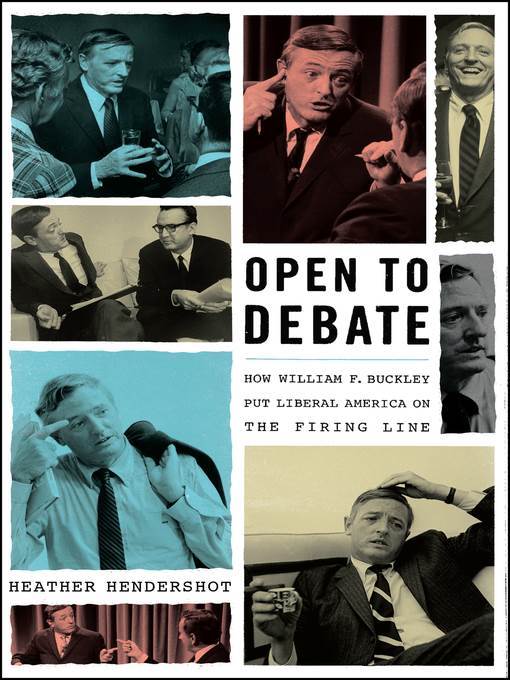
Open to Debate
How William F. Buckley Put Liberal America on the Firing Line
فرمت کتاب
ebook
تاریخ انتشار
2016
نویسنده
Heather Hendershotناشر
Broadside e-booksشابک
9780062430472
کتاب های مرتبط
- اطلاعات
- نقد و بررسی
- دیدگاه کاربران
نقد و بررسی

July 4, 2016
Hendershot (What’s Fair on the Air?), an MIT film and media professor, tells the story of Firing Line, William F. Buckley’s legendary television show, which ran from 1966 to 1999. In her view, Buckley was the “major conservative public intellectual” of post-WWII America, and Firing Line is “a model for what smart political TV once was,” contrasting with today’s on-air incivility. After starting small in New York City, Firing Line became must-see public television for millions nationwide in the 1970s. Stylish and eloquent, Buckley offered smart, telegenic points of view on themes such as communism, the Black Power movement, and feminism, all of which he strongly contested. A parade of public figures came to talk and debate. Presidents Nixon, Carter, and Reagan joined him, as did Barry Goldwater, Margaret Thatcher, John Kenneth Galbraith, Betty Friedan, Eldridge Cleaver, Jack Kerouac, and Allen Ginsberg, to name only a few. Long before cable splintered television audiences, helping to bring Firing Line to an end, Buckley feared televised political theater and its impact on quality programming. Using interviews and transcripts, Hendershot does more than tell the history of a uniquely influential show and personality; her thorough, compelling, and very readable book provides a three-decade journey through the center of the nation’s intellectual life.

A generous description and analysis of Firing Line, the weekly TV show hosted for three decades by conservative icon William F. Buckley Jr.Early on, Hendershot (Film and Media/MIT; What's Fair on the Air?: Cold War Right-Wing Broadcasting and the Public Interest, 2011, etc.) identifies herself as a liberal, but her work is suffused with a fair and balanced approach to the show that eventually found its home on PBS, where it ran for most of its 33 years (1966-1999). The author's research is formidable: interviews, major reliance on National Review (the magazine Buckley founded in 1955), and a comprehensive familiarity with the guests and topics on the show, a familiarity clearly acquired by many hours at the video monitor and many hours of reading transcripts. Hendershot's approach is generally topical and thematic rather than mercilessly chronological. She teaches us about some of the key issues Buckley presented and debated on the program, including Vietnam War crimes, anti-communism, Ronald Reagan's brand of conservatism, Black Power, and the women's movement, among others. Continually, Hendershot reveals Buckley's humor, his enormous vocabulary, his generosity with guests (many of whom he genially eviscerated), and his patrician deference and insistence on decorum. She sometimes becomes a sort of ex post facto judge of the debates, declaring winners and losers. She also shows us the nuts and bolts of the program, especially the determined plainness, even severity, of its simple set and visual effects, virtually unchanged from the show's inception. Periodically--and especially toward the end--Hendershot attacks the impoverished situation of political debate on TV today, and she notes with sadness the return of conspiratorial thinking, which Buckley had worked hard to shove into the shadows. A thoroughly researched work replete with intelligence, admiration, balanced criticism, and even a bit of nostalgia. COPYRIGHT(1) Kirkus Reviews, ALL RIGHTS RESERVED.

September 15, 2016
After Barry Goldwater's defeat in the 1964 presidential election, common wisdom held that conservatism was dead and only the preserve of John Birch Society members, conspiracy theorists, and other fringe elements. William F. Buckley (1925-2008), founder of the conservative National Review magazine, set out to make conservatism a respectable alternative to the dominant liberalism. In 1966, Buckley began hosting Firing Line, an hour-long TV show that aired for 33 years, with more than 1,500 episodes. Hendershot (film & media studies, Massachusetts Inst. of Technology; What's Fair on the Air?) explores what made the broadcast so special. Each week guests verbally sparred with Buckley on a range of current subjects. Far from being a conservative echo chamber, Buckley often hosted guests who were his ideological opposites, such as Black Panthers leader Eldridge Cleaver and feminist Germaine Greer. This allowed for greater exploration of a topic over a longer time frame than permitted by regular news shows. The author makes ample use of quotes from the program, which portray the high level of discourse that occurred. VERDICT Readers interested in politics, the modern conservative movement, and media studies will appreciate this highly readable account of this venerable television program.--Chad E. Statler, Lakeland Comm. Coll., Kirtland, OH
Copyright 2016 Library Journal, LLC Used with permission.

Starred review from September 1, 2016
How is it that sixties firebrands such as Eldridge Cleaver, Germaine Greer, and Noam Chomsky found a favorable venue for voicing their revolutionary messages on a public-issues television show hosted by an iconic American conservative? Hendershot answers this puzzling question by looking closely at how that showFiring Linereflected the remarkable personality of its charismatic host, William F. Buckley. As she surveys the 33 years during which Buckley hosted almost 1,500 episodes, Hendershot recognizes that this cerebral conservative used the program as a platform to shape and promulgate the conservative cause, giving special attention to the Goldwater Revolution. But Hendershot marvels at the diversity of progressive and radical thinkers Buckley invited to share his broadcast stage. Though herself a liberal who shares few of his political views, Hendershot lauds Buckley for the intelligence, honesty, wit, civility, and elan with which he developed meaningful dialogues with these diverse thinkers, dialogues that actually enriched viewers' understanding of the complexities of the nation's political life. Indeed, she laments the difficulty of finding anything remotely similar to Buckley's Firing Line in the predictable and slogan-driven current programming of Fox News on the right and MSNBC on the left. A cogent reminder of what political broadcasting could be.(Reprinted with permission of Booklist, copyright 2016, American Library Association.)

























دیدگاه کاربران